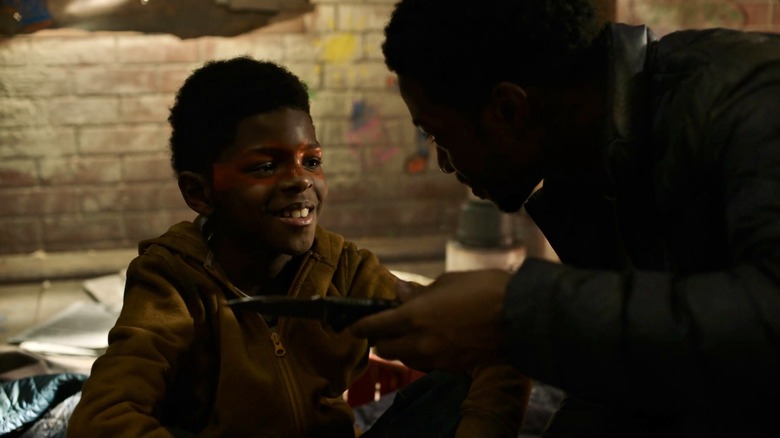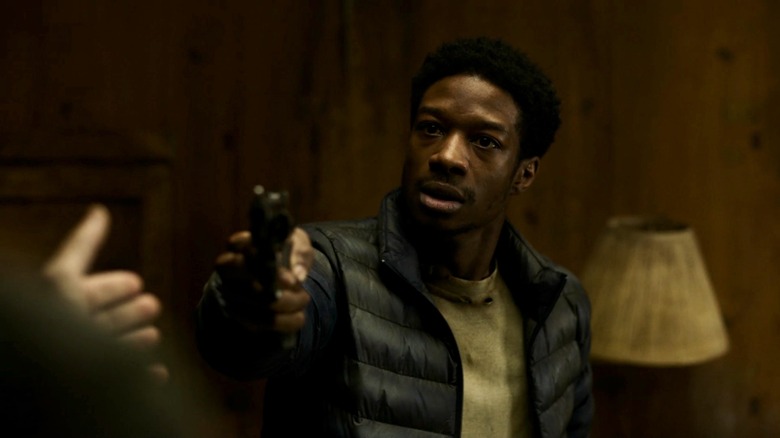The Last Of Us Almost Had An Even Darker Ending To Sam And Henry's Story
This post contains spoilers for "The Last of Us," up to and including the season 1 finale.
Of all the characters to come and go from "The Last of Us" season 1, one of the most brutal departures was that of Henry (Lamar Johnson) and his deaf younger brother Sam (Keivonn Montreal Woodard).
Henry and Sam enter the season at its midpoint as if to show how close to the heart of the show's central theme their story is. Series protagonists Joel (Pedro Pascal) and Ellie (Bella Ramsey) meet Henry and Sam in Kansas City, where the brothers are hiding out from revolutionaries led by the ruthless Kathleen (Melanie Lynskey). As we get to know them, we learn that Sam is Henry's whole world and he's willing to do anything to protect him — which makes it all the more gut-wrenching when Sam gets bitten and succumbs to the Cordyceps infection overnight. After the infected Sam tries to bite Ellie, Henry is forced to shoot his own kid brother, which leaves him so despondent that he takes his own life.
Believe it or not, Henry and Sam's story could have had an even darker ending than that. For co-showrunner Craig Mazin — who already had experience dealing with the fallout of a nuclear disaster in HBO's "Chernobyl" miniseries — the level of human anguish that viewers were prepared to accept in "The Last of Us" required a delicate balancing act. In the May 2023 issue of Empire, Mazin discussed Henry and Sam's ending:
"I was scared, I will readily admit that. Not because I'm a coward, but because I care about the audience. The question was: is it too much? Is it going to feel excessive, nihilistic and exploitative?"
The alternate ending
The overall shape of "The Last of Us" congeals more in its season 1 finale, where we see how Joel and Ellie now parallel Henry and Sam. Joel is willing to do anything to keep Ellie safe, even if it means massacring people and dooming the rest of humanity by depriving it of the potential cure Ellie's immune brain could provide. Elsewhere, Craig Mazin and "The Last of Us" co-showrunner and game co-creator Neil Druckmann have said that the series is about the dangers of unconditional love. Druckmann told Empire that Henry and Sam's deaths hammer home to Joel the importance of protecting Ellie since she's become his only reason for living. "It was important to show that if you lose her, you lose. That's it," he said.
The finale also reveals that Joel previously tried to take his own life after losing his daughter early in the Cordyceps outbreak. Mazin said this revelation originally came earlier in season 1, and it would have seen Henry live to bury his brother, only to leave Joel with some bleak departing words:
"It's the next morning, they bury Sam, and Henry essentially tells Joel, 'You can do whatever you want, try as hard as you can, but she's gonna die. There's no f***ing point.' That was actually the moment where Joel initially revealed that he himself had attempted suicide and failed. And Henry's like, 'No, you're an idiot, you should have done it.' But it was actually even darker and more disturbing that way."
This ending tells, rather than shows, the peril and pointlessness of protecting a loved one at the cost of one's soul, but whether it's truly darker is up to the viewer to decide. "The Last of Us" season 1 is now streaming on HBO Max. Season 2 is in the works — here's what to expect, according to Mazin and Druckmann.

